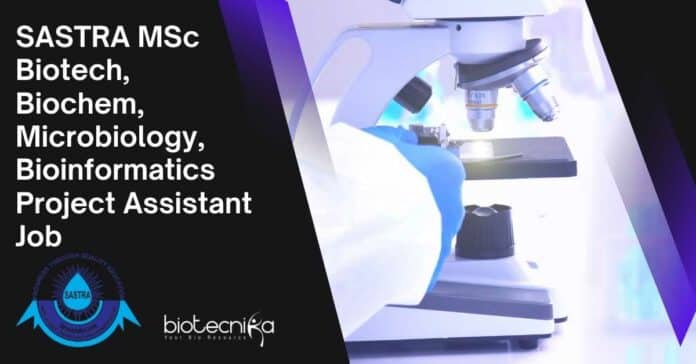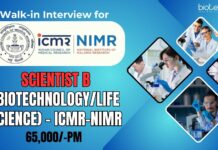SASTRA MSc Bioinformatics, Biochem, Microbiology, Biotech Project Assistant Job
SASTRA MSc Bioinformatics, Biochem, Microbiology, Biotech Project Assistant Job. Interested and eligible applicants can check out all of the details on the same below
Hey, check out some of the possible interview questions for the role of Project Assistant in an Ayurgenomics project at SASTRA University.
This job expires in
APPLICATIONS ARE INVITED FOR THE POSITION OF PROJECT ASSISTANT – IKS PROJECT
Post Name – Project Assistant
No. of Posts – 01
Name of the Project – Impact of Satvik Food on the Gut-Microbiome Diversity: An Ayurgenomics Perspective
Project Description – Development of chemically modified lectins to kill pathogens
Duration – 2 years
Name of sponsoring agency – INDIAN KNOWLEDGE SYSTEMS DIVISION OF MoE @ AICTE, New Delhi
How to Apply
–- Interested candidates may email their detailed resume on or before 10th May 2023 to Dr. Prakash Shankaran, Assistant Professor, School of Chemical & Biotechnology, SASTRA Deemed University, Thanjavur. Email: [email protected].
Essential Qualification –
- First class Master’s degree in Bioinformatics/ Microbiology/ Biotechnology/ Biochemistry
- The applicant must be a highly motivated student with sound theoretical knowledge on microbiology, next-generation sequencing techniques etc,. Good communication skills and willingness to travel for collecting samples is must. The selected candidate will have an excellent opportunity to learn molecular biological techniques including next-gen sequencing and sequence analysis and will be encouraged to pursue PhD at SASTRA University.
- Experience in next-gen sequencing and sequence analysis, good speaking and writing skills in English language are desirable.
Project Description – The project explores the effect of Satvik food on the gut microbiome diversity in the light of Ayurvedic physiologic and psychologic concepts.
Fellowship – 20000/-
Hey, check out some of the possible interview questions for the role of Project Assistant in an Ayurgenomics project at SASTRA University.
- Can you tell us about your experience with next-generation sequencing techniques?
Answer: I have experience in both DNA and RNA sequencing techniques using Illumina sequencing platforms, including library preparation, quality control, and bioinformatics analysis.
- How would you design a study to assess the impact of Satvik food on gut microbiome diversity?
Answer: I would design a randomized controlled trial with a crossover design, where participants are randomly assigned to consume Satvik food or a control diet for a certain period, and then switch to the opposite diet after a washout period. I would collect fecal samples at baseline, after each diet period, and at the end of the study, and perform next-generation sequencing to analyze the gut microbiome diversity.
- Can you explain the concept of Ayurgenomics?
Answer: Ayurgenomics is the integration of Ayurveda, the traditional Indian system of medicine, and genomics, the study of the genetic information of living organisms. The goal of Ayurgenomics is to understand the genetic basis of Ayurvedic concepts and practices and to develop personalized medicine based on an individual’s genetic makeup and Ayurvedic constitution.
- What is your experience with chemically modified lectins, and how would you develop them to kill pathogens?
Answer: I have synthesized and characterized chemically modified lectins as potential antimicrobial agents during my Master’s degree research. To develop lectins to kill pathogens, I would use computational modeling and protein engineering techniques to design lectins with high binding affinity and specificity to the pathogen’s cell surface, and with the ability to disrupt the cell membrane or inhibit essential cellular processes.
- What are some challenges you anticipate in collecting samples for this project, and how would you address them?
Answer: One challenge in collecting fecal samples is ensuring that the samples are representative of the participant’s gut microbiome and are not contaminated by environmental or dietary factors. To address this, I would use strict inclusion and exclusion criteria, provide standardized diets and instructions to the participants, and collect the samples in a sterile manner. Another challenge is the logistics of sample collection from different locations, but I would plan ahead and coordinate with local partners and collaborators to minimize any delays or issues.
Editor’s Note: SASTRA MSc Bioinformatics, Biochem, Microbiology, Biotech Project Assistant Job. Please ensure you are subscribed to the Biotecnika Times Newsletter and our YouTube channel to be notified of the latest industry news. Follow us on social media like Twitter, Telegram, Facebook































This is good